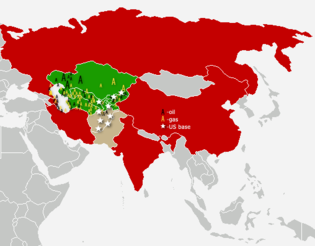The Oil Factor
This article needs additional citations for verification. (October 2010) |
| Oil Factor | |
|---|---|
| Directed by | Gerard Ungerman, Audray Brohy |
| Produced by | Free-Will Production |
Release date |
|
Running time | 93 minutes |
| Language | English |
The Oil Factor, alternatively known as Behind the War on Terror, is a 2004 movie written and directed by Gerard Ungerman and
The documentary aspires to bring an untraditional point of view over the reasons, aspects and motives of this war and the direction of current US foreign policy.
Interviews
Respondents, featuring in the Oil Factor, include:
- Zbigniew Brzezinski, former US DoD adviser
- MIT
- Project for a New American Century
- Paul Bremer, temporary (Iraqi) coalition leader
- Karen Kwiatkowski, retired military adviser in The Pentagon
- Azees Al-Hakim, member of current Iraqi government
- Michael C. Ruppert, author of From the Wilderness, studying the peak oil issue (among others)
- press agency in Jordan
- Gen. Piérre-Marie Gallois, energy-strategy analyst
- David Mulholland, editor of magazine focused on military technology
- Ahmed Rashid, author of The Taliban book
Locations
The filmmakers were shooting in several locations of
Introductory presupposition
During the film, the spectator is given some prepositions and axioms that become a basis for film authors' argumentation, such as:
- Oil is indispensable in every aspect of our modern-way lives.
- World hydro-carbon energy.
- Demand for oil is and will be growing as new markets (e.g. India and China) gains in strength and local consumers start to demand higher life standard.
- 75% of the world's oil discoveries are located in the Middle East, as well as the ratio of the volume of oil needed to be imported to the United States.
- From 2010 on, economies of some continents or world regions will run out of oil and that will make them utterly dependent on foreign oil supply. The film says: "The reality is, however, that major conflicts are likely to erupt before any of these players actually runs out of oil."
Argumentation
On the basis of these presuppositions, the film tries to examine the steps taken in the name of US foreign policy from this point of view. It refers to the motives of the United States in 2000 to build new military bases in the Middle East in order to increase their strategic power. It comes to the conclusion that the best candidate to this was Iraq as the country with the world's second biggest oil reserves, as well as its military being weakened by a dozen years of bombing on a weekly basis. According to David Mulholland, political power in the region is determined by the control of oil exports from this country.
Oil Factor is also sceptical about consequences of all current wars both on local populations and American soldiers.
Iraq
The documentary first analyzes the development of support of Iraqi citizens that showed exacerbation approximately year and half after the invasion. It also touches the issue of 320+
Afghanistan

The part dedicated to the invasion to
The documentary answers this question via
American presence in oil-rich regions
In the last part of Oil Factor, the filmmakers go in for coalition (and especially US) soldiers, negatively acknowledge media campaigns to aid to recruit another young American men to join
See also
- Michael Klare
- Trans-Afghanistan Pipeline
Books
- ISBN 80-903355-0-0
- ISBN 0-465-02726-1, [1]
External links
- Official site
- The Oil Factor: Behind the War on Terror on IMDb
- Oil Factor on Google Video
- Short review on Democracy Now!
- The Oil Factor at AllMovie

